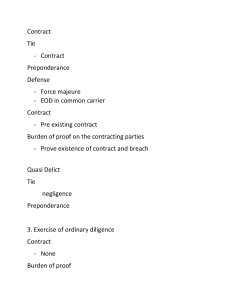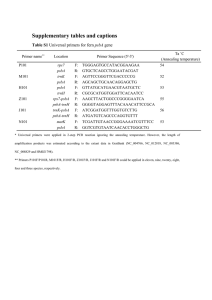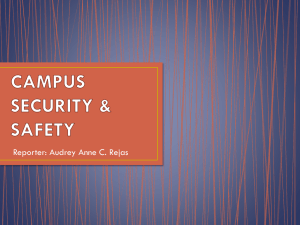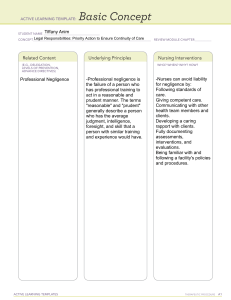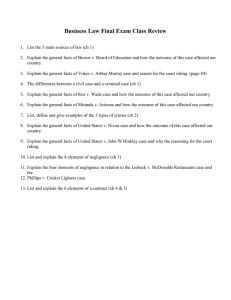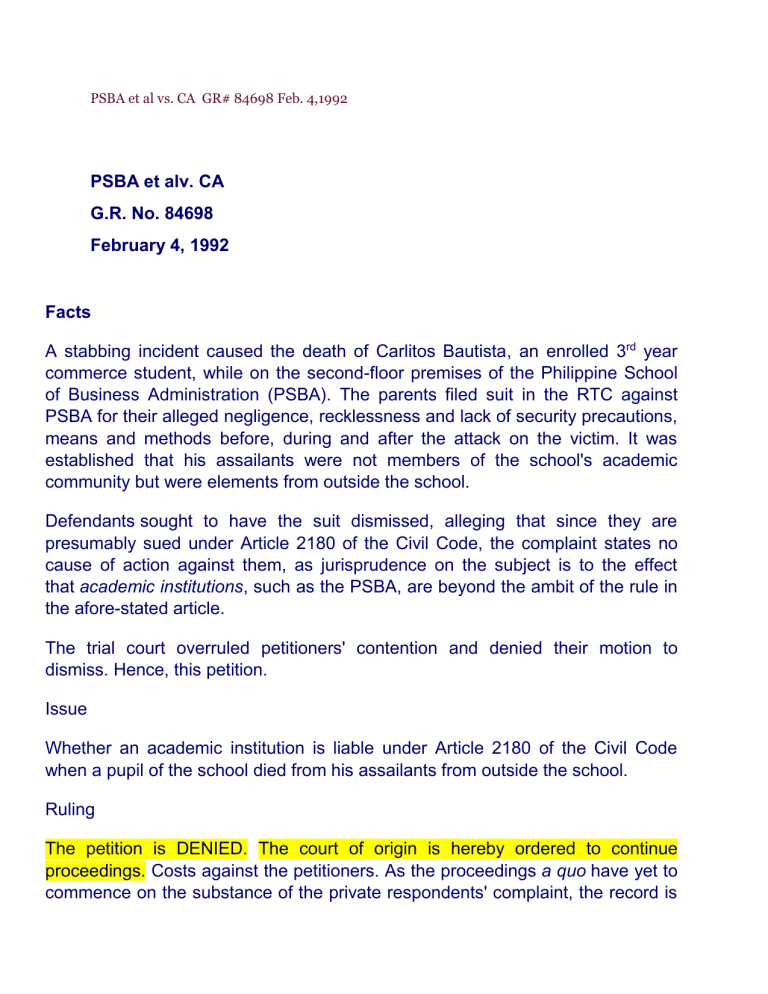
PSBA et al vs. CA GR# 84698 Feb. 4,1992 PSBA et alv. CA G.R. No. 84698 February 4, 1992 Facts A stabbing incident caused the death of Carlitos Bautista, an enrolled 3rd year commerce student, while on the second-floor premises of the Philippine School of Business Administration (PSBA). The parents filed suit in the RTC against PSBA for their alleged negligence, recklessness and lack of security precautions, means and methods before, during and after the attack on the victim. It was established that his assailants were not members of the school's academic community but were elements from outside the school. Defendants sought to have the suit dismissed, alleging that since they are presumably sued under Article 2180 of the Civil Code, the complaint states no cause of action against them, as jurisprudence on the subject is to the effect that academic institutions, such as the PSBA, are beyond the ambit of the rule in the afore-stated article. The trial court overruled petitioners' contention and denied their motion to dismiss. Hence, this petition. Issue Whether an academic institution is liable under Article 2180 of the Civil Code when a pupil of the school died from his assailants from outside the school. Ruling The petition is DENIED. The court of origin is hereby ordered to continue proceedings. Costs against the petitioners. As the proceedings a quo have yet to commence on the substance of the private respondents' complaint, the record is bereft of all the material facts. Obviously, at this stage, only the trial court can make such a determination from the evidence still to unfold. Rationale NOT a case of Quasi-Delict. When an academic institution accepts students for enrollment, there is established a contract between them, resulting in bilateral obligations which both parties are bound to comply with. For its part, the school undertakes to provide the student with an education that would presumably suffice to equip him with the necessary tools and skills to pursue higher education or a profession. On the other hand, the student covenants to abide by the school's academic requirements and observe its rules and regulations. Institutions of learning must also meet the implicit or "built-in" obligation of providing their students with an atmosphere that promotes or assists in attaining its primary undertaking of imparting knowledge. Because the circumstances of the present case evince a contractual relation between the PSBA and Carlitos Bautista, the rules on quasi-delict do not really govern. Quick Review of the law of quasi-delicts - Articles 2176 and 2180 of the Civil Code Article 2176: Whoever by act or omission causes damage to another, there being fault or negligence, is obliged to pay for the damage done. Such fault or negligence, if there is no pre-existing contractual relation between the parties, is called a quasi-delict and is governed by the provisions of this Chapter. Article 2180:The obligation imposed by article 2176 is demandable not only for one's own acts or omissions, but also for those of persons for whom one is responsible. Jurisprudence states that the damage should have been caused or inflicted by pupils or students of the educational institution sought to be held liable for the acts of its pupils or students while in its custody Teachers or heads of establishments of arts and trades shall be liable for damages caused by their pupils and students or apprentices, so long as they remain in their custody. The responsibility treated of in this article shall cease when the person herein mentioned prove that they observed all the diligence of a good father of a family to prevent damage." The law holds the teachers and heads of the school staff liable unless they relieve themselves of such liability pursuant to the last paragraph of Article 2180 by "proving that they observed all the diligence to prevent damage." This can only be done at a trial on the merits of the case. 5 Civil Code on Human Relations, particularly Article 21, which provides: Any person who wilfully causes loss or injury to another in a manner that is contrary to morals, good custom or public policy shall compensate the latter for the damage. (emphasis supplied). Article 1173, Civil Code provides: The fault or negligence of the obligor consists in the omission of that diligence which is required by the nature of the obligation and corresponds with the circumstances of the persons, of the time and of the place. When negligence shows bad faith, the provisions of articles 1171 and 2201, paragraph 2, shall apply.
